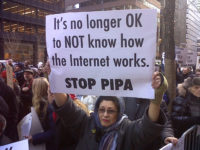For the past two years, the prospect of creating a Netflix tax or Internet tax has been the digital policy issue that would not die in Canada. The Standing Committee on Canadian Heritage called for an Internet tax last June, the province of Quebec remains anxious to pay digital sales taxes (there is nothing stopping them from doing so now), and many creator groups continue to the call for mandated contributions on Netflix to “level the playing the field” (the level playing field argument is misleading). The uncertainty surrounding Netflix and ISP taxes has not been helped by the reopening of the issue at the CRTC after the release of the government’s digital Cancon strategy and Canadian Heritage Minister Melanie Joly’s occasionally leaving the door open to the possibility.
Blog
Canadian Copyright Diplomacy: My Appearance before the Senate Standing Committee on Foreign Affairs
Last week, I appeared before the Senate Standing Committee on Foreign Affairs as part of its study on the impact and utilization of culture and arts in foreign policy and diplomacy. I was asked to consider the impact of Canadian copyright in foreign diplomacy, leading to an interesting and engaging discussion that touched on everything from the changes to the IP provisions in the TPP to the legality of streaming services. My opening remarks, which emphasized the potential for Canada to engage in copyright diplomacy by serving as model for other countries, is posted below.
No Panic: Canadian TV and Film Production Posts Biggest Year Ever Raising Doubts About the Need for Site Blocking and Netflix Regulation
This year in digital and broadcast policy is likely to be dominated by two lobbying efforts: the radical website blocking plan proposed by the Bell coalition and the ongoing efforts from Canadian culture groups to impose new regulations on online video services such as Netflix. At the heart of both lobbying efforts are similar claims that seek to paint the Canadian cultural sector at risk of collapse without new regulations in the form of blocking or mandated contributions. Last week, the Canadian Media Production Association released Profile 2017, its annual report on the state of the industry. The latest report tells a remarkable success story. Far from the doom and gloom, the Canadian industry is achieving record growth, suggesting that website blocking and new Internet regulations are ill-advised solutions in search a problem.
Thousands Slam Bell Coalition’s Website Blocking Proposal in Submissions to the CRTC
If the Bell coalition’s website blocking proposal was designed to garner attention, it achieved its goal as the proposal attracted thousands of individual submissions to the CRTC within days of it being posted online. The massive response is overwhelmingly negative, however, with thousands of Canadians registering their objections to the proposal. I wrote about the site blocking plan in a Globe and Mail op-ed and discussed it in an interview with CBC’s As It Happens. I will have many more posts on why the radical proposal should be rejected in the days ahead.
Canada’s SOPA Moment: Why the CRTC Should Reject the Bell Coalition’s Dangerous Internet Blocking Plan
Six years ago, then Public Safety Minister Vic Toews was challenged over his plans to introduce online surveillance legislation that experts feared would have significant harmful effects on privacy and the Internet. Mr. Toews infamously responded that critics “could either stand with us or with the child pornographers.” The bill and Mr. Toews’ comments sparked an immediate backlash, prompting the government to shelve the legislation less than two weeks after it was first introduced.
This week, telecom giant Bell led a coalition of companies and associations called FairPlay Canada in seeking support for a wide-ranging website blocking plan that could have similarly harmful effects on the Internet, representing a set-back for privacy, freedom of expression, and net neutrality. My Globe and Mail op-ed notes the coalition’s position echoes Mr. Toews, amounting to a challenge to the government and the Canadian Radio-television and Telecommunications Commission (the regulator that will consider the plan) that they can either stand with them or with the pirates.











